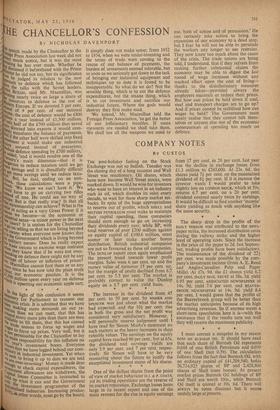COMPANY NOTES
By CUSTOS THE post-holiday feeling on the Stock Exchange was not so bullish. Tuesday was the closing day of a long account and Wall Street was reactionary. Oil shares, which have now become Wall Street stocks, were marked down. It would be wise for investors who want to have an interest in an industry such as oil, which doubles its sales every decade, to wait for these sharp market set- backs. In spite of the huge appropriations to reserve out of profits, which SHELL and BRMSH PETROLEUM must make to maintain their capital spending, these companies should earn enough to go on increasing their dividends every year, while BP, with total reserves of over £200 million against an equity capital of £100.6 million, must sooner or later make another bonus distribution. British industrial companies are not so favoured as these oil companies. The DUNLOP report once again emphasised the present trend towards lower profit margins. Sales were 6 per cent, up and the money value of turnover 15 per cent, up. but the margin of profit declined from 6.2 per cent. to 5.3 per cent. The market is probably correct to value the Dunlop equity on a 6.7 per cent. yield basis.
The increase in the dividend from 45 per cent. to 50 per cent. by MARKS AND SPENCER was just about what the market had expected, and the 10+ per cent, rise in both the gross and the net profit was considered very satisfactory. However, I will personally reserve judgement until lf have read Sir Simon Marks's statement on such matters as the heavy increases in shop rateable values. The earnings on the equity capital have reached 90 per cent., but at 65s. the dividend and earnings yields are only 3.9 per cent. and 7 per cent. respec- tively. Sir Simon will have to be very reassuring about the future to justify the exceptional investment status of his shares.
One of the dullest shares from the point of view of market behaviour is J. & P. COATS, yet its trading operations are the reverse of its market reputation. Exchange losses loom large in its recent report and one of the main reasons for the rise in equity earnings from 17 per cent. to 26 per cent, last year was the decline in exchange losses from £1.3 million to £245,000. At 23s. 6d. the shares yield 77} per cent. on the maintained dividend of 8f per cent. If it is income the investor wants I would prefer to take slightly less On LONDON BRICK, which at 59s. returns 6.7 per cent. on a 20 per cent. dividend covered nearly twice by earnings. It would be difficult to find another 'income' share yielding as much with anything like the same security.
• The sharp drop in the profits of the DAILY MIRROR was attributed to the news- paper strike, the increased distribution costs during the railway strike and the higher level of operating costs. Since the increase in the price of the paper to 2d. last Septem- ber, trading profits have been satisfactory. The maintenance of the dividend of 22+ per cent, was made possible by the com- pany's investment income (from A. E. Reed and Anglo-Canadian Pulp and Paper Mills). At 17s. 9d. the £1 shares yield 6.2 per cent. DAILY MAIL TRUST at 38s. 3d. yield 6.95 per cent. ASSOCIATED NEWSPAPERS at 14s. 9d. yield 7.6 per cent. and BEAVER- BROOK NEWSPAPERS at 14s. 9d. yield 8.4 per cent. I would guess that the profits of the Beaverbrook group will be better than the market anticipates because of its high advertising revenues. So if anyone wants a short-term speculation here it is—with the assurance that if the results turn out well they will receive the maximum publicity.
I must correct a misprint in my recent note on BURMAII OIL. It should have read that each share of Burmah Oil represents 0.648 of one British Petroleum and 0.059 of one Shell (not 0.59). The calculation follows from the fact that Burmah Oil, with an ordinary capital of £41,209,540, holds 26,714,925 shares of BP and 2,428,800 shares of Shell (cum bonus). At present market prices Burmah Oil holdings of BP and Shell are worth 104s., while Burmah Oil itself is quoted at 89s. 6d. There will always be some discount but it seems unduly large at present.










































 Previous page
Previous page